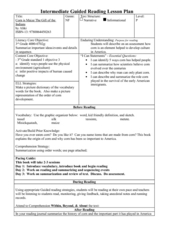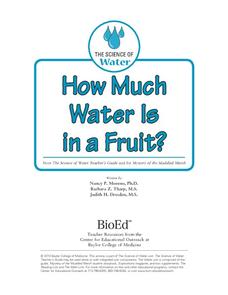NASA
Is It Alive?
Determining whether or not something is living can be more difficult than it seems. Put your young scientists to work defining their own criteria to identify life, then work with three samples to see if they are alive or...
Brigham Young University
Rosencrantz and Guildenstern Are Dead: Word Squares
Encourage your class to use a variety of strategies to learn and retain vocabulary words. The plan suggests that near the beginning of your reading of Rosencrantz and Guildenstern Are Dead pupils should find words in the text that are...
Teach Engineering
What is GIS?
Is GIS the real manifestation of Harry Potter's Marauders Map? Introduce your class to the history of geographic information systems (GIS), the technology that allows for easy use of spatial information, with a resource that teaches...
Curated OER
Intermediate Guided Reading Lesson Plan for: Corn is Maize The Gift of the Indians
A lovely guided reading lesson awaits you and your students. They read the book,Corn is Maize: The Gift of the Indians, by Aliki, summarize the important events of the story, and describe how corn has helped develop culture in America.
Curated OER
Rosencrantz and Guildenstern Are Dead: DR-TA Strategy
Making predictions is an excellent reading strategy. Work on building this into your pupils' toolkit of strategies by trying out the process outlined here for reading the very beginning of Rosencrantz and Guildenstern Are Dead. The...
Curated OER
Rosencrantz and Guildenstern Are Dead: "Teach Each Other" Discussion
Challenge your class to hold a discussion about the theme of death in Rosencrantz and Guildenstern Are Dead without direct teacher guidance. After going over the discussion protocols and quotes from the text, learners move in a circle...
Illustrative Mathematics
Are These Right?
Is that a right triangle or a wrong triangle? Young mathematicians look at eleven different shapes and use a measuring tool of their choice to determine which triangles have right angles. Consider cutting out sets of the shapes to...
Arkansas Government
Creative Adventures with Literature - Whoever You Are
Celebrate our similarities and differences through multiple readings of Whoever you Are by Mem Fox. Readings are accompanied by a grand discussion, charts, creative art, dramatic, and music play to reinforce the uniqueness that is...
Advocates for Human Rights
Who are Immigrants?
What do Jerry Yang, Patrick Ewing, John Muir, Charlize Theron, Peter Jennings, and Saint Frances X Cabrini all have in common? They are all immigrants to the United States. Famous and not-so-famous immigrants are the focus of a resource...
Oxfam
Sweatshops - Exploitation Is Never in Fashion
Here's a resource that brings home the idea that we are all part of a global community, that our actions have far reaching consequences. Class members examine the labels in their clothes, create a list of the manufacturers, the countries...
Skyscraper Museum
What is a Skyscraper?
Skyscrapers are amazing feats of architectural design that create the iconic skylines of the world's biggest cities. Young architects explore the defining characteristics of these monstrous towers with the first instructional activity in...
Bowland
How Risky is Life?
"Life is more risk management, rather than exclusion of risks." -Walter Wriston. Scholars use provided mortality data to determine how likely it is a person will die from a particular cause. They compare the data to the perception of the...
Baylor College
How Much Water Is in a Fruit?
Compare the volume of an orange to the volume of liquid that can be extracted out of it. Also compare the mass of an apple before and after it has been dried out. In both of these activities, children find that there is an appreciable...
Wind Wise Education
Where is it Windy?
How is the wind up there? The class builds a topography model using materials available in the classroom, then place wind flags in different locations on the landscape. Using a fan as a wind source, pupils collect data about how wind...
WindWise Education
What is Wind Power's Risk to Birds?
How is risk determined? Through the use of a reading passage, individuals or groups learn about bird interactions with man made structures along with wind turbines. Pupils use information from the second reading passage to conduct an...
Howard Hughes Medical Institute
Human Feet Are Strange
Feet are neat! So, if you've already walked the path of examining animal footprints with your class, put them in the shoes of early humans! A well-designed activity incorporates video, discussion, and hands-on learning to demonstrate how...
Baylor College
What Is a Neuron?
Your class won't get on your nerves while doing this modeling activity! After teaching the structure and function of a neuron using the included diagrams, give individuals some clay and chenille stems so that they can make their own...
California Academy of Science
How Big is Big?
In a math or life science class, "mini-me" models are created with cardstock to reflect a 1:10 scale of students' bodies. Learners measure each others' heights with meter sticks, and then reduce the size by 10. After this exercise, they...
Baylor College
What Is the Water Cycle?
Small groups place sand and ice in a covered box, place the box in the sunlight, then observe as evaporation, condensation, and precipitation occur. These models serve as miniature water cycles and demonstrations of the three phases of...
Baylor College
How Can We Find Out What Is in Water?
Using paper chromatography, water watchers discover that several substances might be dissolved even though they aren't visible. In this case, you will prepare a mixture of three different food colorings for them to experiment with. A...
Foundation for Water & Energy Education
How is Flowing Water an Energy Source? Activity A
Here is a fun little exploration of the potential energy potential of falling water. Learners drop water from various heights using a straw, and they analyze the diameter of the splash. Pair this with two more activities of the same...
Curated OER
Using Is and Are
First graders discuss when to use "is" and "are" in a sentence. They practice using is and are correctly in sentences and practice writing sentences using "is" and "are" in their writing. Students complete a worksheet using is and are.
University of Colorado
Is There Life on Earth?
To find life on another planet, scientists look for gases (atmosphere), water, and temperatures that are not extreme. In this activity, groups of pupils become "Titan-ians," scientists who want to explore Earth for possible life forms....
Teaching Children Philosophy
Tiger-Tiger, is it True?
Scholars take part in a philosophical discussion about truth, thoughts, and feelings following a reading of Tiger-Tiger is it True? by Byron Katie and Hans Wilhelm.
Other popular searches
- Using Is and Are
- Be Verbs: Is Are
- Be Verbs Is Are
- There Is and There Are
- Verb Tense Is Are
- There Is" and "There Are
- There Is There Are
- Is and Are Verbs
- Is Are Was Were
- Am Is Are
- There Is/there Are
- Using Am/is/are























